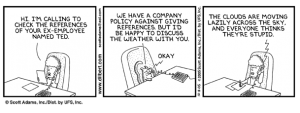I am often amazed to hear about people being hired to top-level advancement positions whom I know to be vastly unqualified to do the job. We have all seen this happen. There is no doubt that some people are very skilled at interviewing and getting jobs, but they inevitably crash and burn because they are simply unable to perform and deliver.
So how does this happen? How do these folks get hired? Why do search firms put forth candidates to their clients who are unqualified for the position?
In the final analysis of a candidate, after they have successfully navigated the interview process, reference checking becomes central to an up or down decision. It is all too common to ask the candidate to provide references from prior supervisors, board members and staff who reported to them. However, when candidates are currently employed, their current bosses and colleagues cannot be contacted, thus removing one generation of references. Job “jumping” often is enabled by this strategy of parachuting out before you are let go. We are astonished at how often resumes that show a long list of short-tenure positions or clearly exaggerated accomplishments aren’t flagged for more thorough follow-up.
When I see people landing jobs who would not get beyond the first round in the searches Copley Raff conducts, I have to assume their references were not properly vetted. Our reference-checking approach is multi-layered and strategic, going well beyond the few names that may be provided on a list. We target past organizations where the candidate worked and pull from the organization’s 990 (via Guidestar) names of board members and CEOs during their period of employment. We also confirm the contributed revenue the candidate claims was raised under their leadership and the specific role they played in the solicitations.
An important step is to unearth additional reference names we consider germane to the position the candidate is seeking, and ask the candidate’s permission to call them. If permission is not granted, that may be a red flag that is added to our analysis. If the candidate grants permission to speak with additional references, then we’re on firmer ground when making a recommendation.
The reference-checking conversation is extremely important to finesse. I say finesse, because in this litigious world, references can be reluctant to be honest about candidate shortcomings. The old adage is, “Nobody gives bad references. They are too afraid of being sued.”
In addition to taking a strategic approach to these discussions, we recommend that you establish trust and rapport with the reference at the outset of the conversation. It is incumbent upon you to ensure that this candidate is the best fit for the organization; therefore, you must be able to delve below the surface while ensuring confidentiality.
One strategy we suggest is to begin with questions that offer yes or no responses, making further elaboration unnecessary but optional.
· Was it a supportive and positive work environment when candidate was leading the department?
· Are you aware of the candidate helping to close (a particular exemplar gift)?
· Did candidate work well with his/her team members?
· Was the candidate an effective communicator?
· Did you hear accolades about the candidate?
· Did you hear criticism about the candidate?
If the discussion is going well, close with more open-ended questions that allow for further elaboration:
· What qualities immediately come to mind when characterizing the candidate?
· What did the candidate do well?
· What do you think the candidate could have done better?
· How would you characterize the candidate’s leadership style?
· What impact has the candidate had on the advancement program? The organization as a whole?
· And the obligatory…would you rehire the candidate?
Your takes:
1. Understand that hiring a top advancement professional is one of the more critically important decisions in an organization.
2. Recognize that some candidates are very skilled at job interviews and can adroitly mask crucial shortcomings.
3. Peel back the layers of the onion! Interviews with references are essential to the discovery process. Craft your inquiries carefully and be prepared to “read between the lines” of messages conveyed by the references.
For more information about Copley Raff and its spectrum of consulting services, please see www.copleyraff.com. Follow CRI on Twitter @copleyraff.



